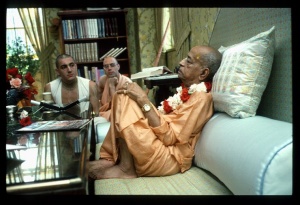CC Madhya 1.227 (1975): Difference between revisions
(Vanibot #0027: CCMirror - Mirror CC's 1996 edition to form a basis for 1975) |
(Vanibot #0020: VersionCompareLinker - added a link to the Version Compare feature) |
||
| Line 2: | Line 2: | ||
<div style="float:left">'''[[Sri Caitanya-caritamrta (1975)|Śrī Caitanya-caritāmṛta (1975)]] - [[CC Madhya (1975)|Madhya-līlā]] - [[CC Madhya 1 (1975)|Chapter 1: The Later Pastimes of Lord Śrī Caitanya Mahāprabhu]]'''</div> | <div style="float:left">'''[[Sri Caitanya-caritamrta (1975)|Śrī Caitanya-caritāmṛta (1975)]] - [[CC Madhya (1975)|Madhya-līlā]] - [[CC Madhya 1 (1975)|Chapter 1: The Later Pastimes of Lord Śrī Caitanya Mahāprabhu]]'''</div> | ||
<div style="float:right">[[File:Go-previous.png|link=CC Madhya 1.226 (1975)|Madhya-līlā 1.226]] '''[[CC Madhya 1.226 (1975)|Madhya-līlā 1.226]] - [[CC Madhya 1.228 (1975)|Madhya-līlā 1.228]]''' [[File:Go-next.png|link=CC Madhya 1.228 (1975)|Madhya-līlā 1.228]]</div> | <div style="float:right">[[File:Go-previous.png|link=CC Madhya 1.226 (1975)|Madhya-līlā 1.226]] '''[[CC Madhya 1.226 (1975)|Madhya-līlā 1.226]] - [[CC Madhya 1.228 (1975)|Madhya-līlā 1.228]]''' [[File:Go-next.png|link=CC Madhya 1.228 (1975)|Madhya-līlā 1.228]]</div> | ||
{{CompareVersions|CC|Madhya 1.227|CC 1975|CC 1996}} | |||
{{RandomImage}} | {{RandomImage}} | ||
==== TEXT 227 ==== | ==== TEXT 227 ==== | ||
<div class="verse"> | <div class="verse"> | ||
:prāte | :prāte cali' āilā prabhu 'kānāira nāṭaśālā' | ||
:dekhila sakala tāhāṅ kṛṣṇa-caritra-līlā | :dekhila sakala tāhāṅ kṛṣṇa-caritra-līlā | ||
</div> | </div> | ||
| Line 18: | Line 17: | ||
<div class="synonyms"> | <div class="synonyms"> | ||
prāte—in the morning; | prāte—in the morning; cali'-departing; āilā—came; prabhu—the Lord; kānāira nāṭaśālā—to the place of the name Kānāi Nāṭaśālā; dekhila—saw; sakala—all; tāhāṅ—there; kṛṣṇa-caritra-līlā—the pastimes of Kṛṣṇa. | ||
</div> | </div> | ||
| Line 25: | Line 24: | ||
<div class="translation"> | <div class="translation"> | ||
In the morning, the Lord left and went to a place known as Kānāi Nāṭaśālā. While there, He saw | In the morning, the Lord left and went to a place known as Kānāi Nāṭaśālā. While there, He saw may pastimes of Lord Kṛṣṇa. | ||
</div> | </div> | ||
| Line 32: | Line 31: | ||
<div class="purport"> | <div class="purport"> | ||
In those days in Bengal there were many places known as Kānāi Nāṭaśālā, where pictures of the pastimes of Lord Kṛṣṇa were kept. People used to go there to see them. This is called kṛṣṇa-caritra-līlā. In Bengal there are still many places called hari-sabhā, which indicates a place where local people gather to chant the Hare Kṛṣṇa mahā-mantra and discuss the pastimes of Lord Kṛṣṇa. The word kānāi means | In those days in Bengal there were many places known as Kānāi Nāṭaśālā, where pictures of the pastimes of Lord Kṛṣṇa were kept. People used to go there to see them. This is called kṛṣṇa-caritra-līlā. In Bengal there are still many places called hari-sabhā, which indicates a place where local people gather to chant the Hare Kṛṣṇa mahā-mantra and discuss the pastimes of Lord Kṛṣṇa. The word kānāi means "Lord Kṛṣṇa's," and nāṭaśālā indicates a place where pastimes are demonstrated. So those places which at the present moment are called hari-sabhā may previously have been known as Kānāi Nāṭaśālā. | ||
</div> | </div> | ||
Latest revision as of 05:14, 27 January 2020

A.C. Bhaktivedanta Swami Prabhupada
TEXT 227
- prāte cali' āilā prabhu 'kānāira nāṭaśālā'
- dekhila sakala tāhāṅ kṛṣṇa-caritra-līlā
SYNONYMS
prāte—in the morning; cali'-departing; āilā—came; prabhu—the Lord; kānāira nāṭaśālā—to the place of the name Kānāi Nāṭaśālā; dekhila—saw; sakala—all; tāhāṅ—there; kṛṣṇa-caritra-līlā—the pastimes of Kṛṣṇa.
TRANSLATION
In the morning, the Lord left and went to a place known as Kānāi Nāṭaśālā. While there, He saw may pastimes of Lord Kṛṣṇa.
PURPORT
In those days in Bengal there were many places known as Kānāi Nāṭaśālā, where pictures of the pastimes of Lord Kṛṣṇa were kept. People used to go there to see them. This is called kṛṣṇa-caritra-līlā. In Bengal there are still many places called hari-sabhā, which indicates a place where local people gather to chant the Hare Kṛṣṇa mahā-mantra and discuss the pastimes of Lord Kṛṣṇa. The word kānāi means "Lord Kṛṣṇa's," and nāṭaśālā indicates a place where pastimes are demonstrated. So those places which at the present moment are called hari-sabhā may previously have been known as Kānāi Nāṭaśālā.